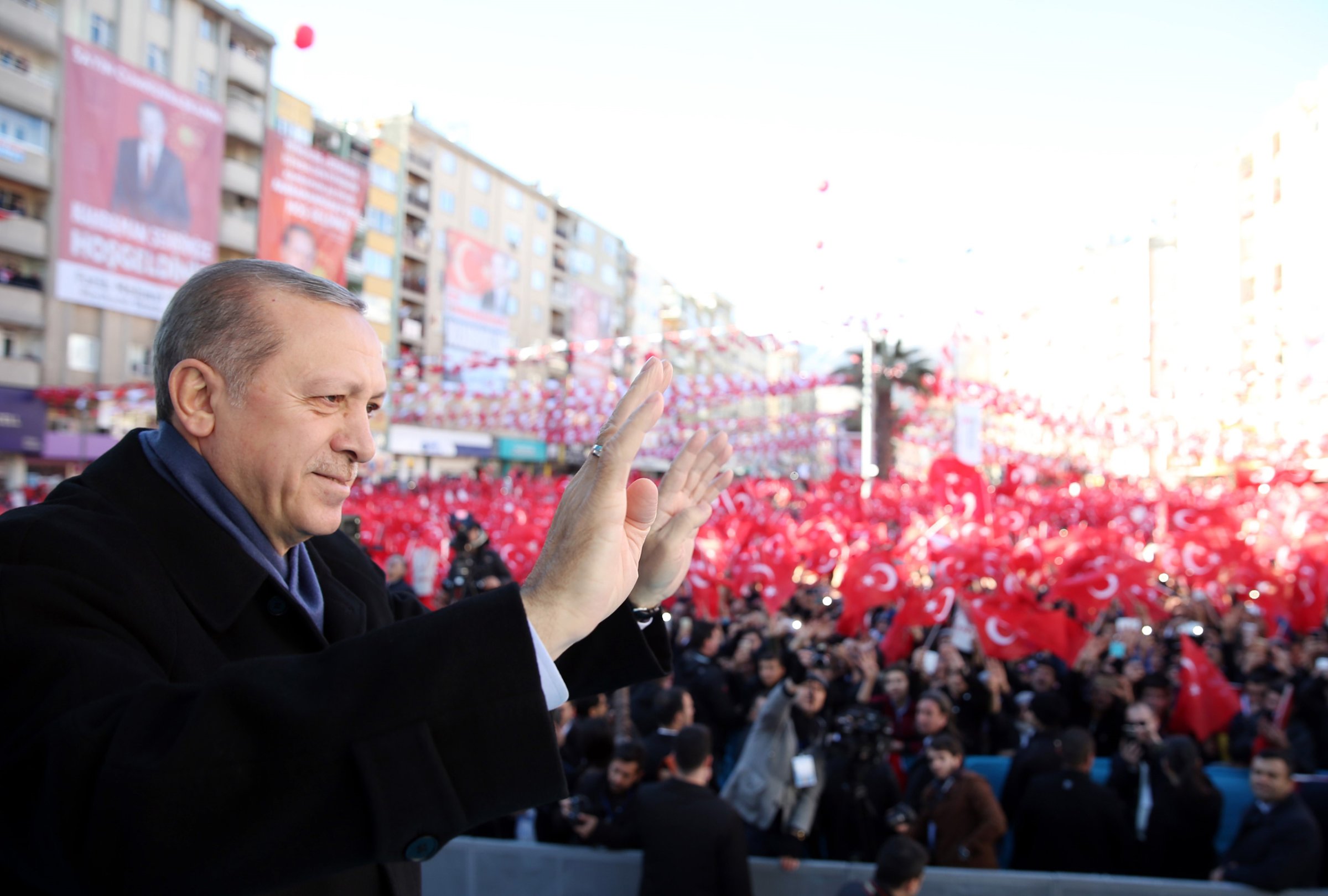
President Recep Tayyip Erdogan is leaving nothing to chance.
Launching his campaign on Feb. 17 to expand the power of his office via a constitutional referendum, the President came out with rhetorical guns blazing. He likened the opponents of the proposed amendments to those who plotted the bloody July 2016 coup attempt that failed to dislodge him from power. He compared potential “no” voters to “terrorists.”
The president’s public bombast belies the fact that with less than two months to go before the April 16 vote, public support for the proposed constitutional revision is lukewarm at best. Even in a country where the pro-government faction dominates the media and authorities jail some political opponents, Erdogan’s victory in the referendum does not look assured. A poll released on Feb. 14 showed the “no” votes beating the yes votes 47.5 to 43.9 percent, with 10 percent still undecided.
The extent of opposition sets up a campaign with the highest of stakes. If the constitutional amendments pass, Erdogan stands to fortify his grasp on power. If the proposal loses, it would deal an embarrassing defeat to Erdogan, opening a new chapter of political uncertainty for the country.
There’s little question the constitutional overhaul would, if approved, hand enormous new responsibilities to Erdogan. The changes would eliminate the office of prime minister, grant the president the authority to appoint and sack ministers, limit parliament’s ability to challenge the executive, and permit the president to formally lead a political party.
Erdogan and his faction argue the changes would bring much-needed political stability to shore up the state in the face of terrorist attacks and swirling regional volatility. Opponents say the changes would fatally undermine Turkey’s already beleaguered democracy, opening an era of autocracy.
Perhaps most worrying for Erdogan and his supporters, the president’s own Justice and Development Party (known by the Turkish acronym AKP) appears to be increasingly divided over the reforms. In one public opinion poll, 35 percent of AKP members said they would not vote yes. Even Turkey’s former prime minister under Erdogan, Ahmet Davutoglu, said publicly in January that he had “concerns” about the planned constitutional overhaul.
Some are confused why the changes are needed, when Erdogan already enjoys sweeping power. In the wake of the failed and deadly coup attempt in July 2016, Erdogan’s government suspended or detained tens of thousands of civil servants and military officials. Dozens of news organizations were closed. At least 12 opposition members of parliament have been detained. With these kinds of powers already in his possession, why transform the constitution?
“They have failed to explain to their own people what it actually means to change the constitution and go for a presidential system. Not everyone understands what Erdogan is trying to do,” says Burak Kadercan, an expert on Turkish politics at the U.S. Naval War College.
But privately, some members are expressing concerns about the potential for a massive centralization of power in the hands of the executive. “Obviously it is not a democratic move, and so there is this kind of uneasiness on the part of the [AKP] people,” Etyen Mahcupyan, a prominent journalist and former advisor to Davutoglu, tells TIME. “It’s like the pot boiling.”
The opposition within the ruling party remains a silent movement. Aside from Davutoglu’s gentle statement of misgivings, no major AKP figures have come forward to oppose the president. The former prime minister himself felt compelled to resign in May 2016, in a move that analysts said was prompted in part by his failure to lend full-throated support for Erdogan’s proposed constitutional changes.
“No one is in a position to come forward and challenge Tayyip Erdogan. So that’s the situation: there is discontent. There is this energy of a kind of opposition, but it is not said out loud very much,” adds Mahcupyan, in a phone interview.
That’s not a big surprise given how Erdogan has sidelined his rivals. The “no” campaign has been demonized and most of the media fear reprisals if they challenge the president. In addition, the left-wing, pro-Kurdish Peoples’ Democratic Party (HDP) is reeling following the arrest of dozens of its top leaders, including members of parliament. The clampdown on the party could depress turnout among minority Kurdish voters, a majority of whom are believed to oppose the constitutional changes.
“It’s going to be tough. We are not well organized now because of all this pressure, but we know that there is a deep dissatisfaction against Erdogan, particularly as the economic crisis is deepening. There is definitely a chance. So, it is not a done deal for President Erdogan,” says Hisyar Ozsoy, a lawmaker affiliated with the opposition HDP.
In the weeks leading up to the referendum, Erdogan is expected to campaign heavily for a “yes” vote, traveling the country in a campaign stressing the themes of security and stability. The president remains a popular, if polarizing figure, and he could yet translate his charisma into a win in the referendum.
Increasingly, the vote seems less about changes to the constitution, and more on the president himself. “He has a lot of stake in this,” says Kadercan. “He personalized this by putting himself back into the field, and putting his name behind yes.”
More Must-Reads from TIME
- Inside Elon Musk’s War on Washington
- Meet the 2025 Women of the Year
- Why Do More Young Adults Have Cancer?
- Colman Domingo Leads With Radical Love
- 11 New Books to Read in Februar
- How to Get Better at Doing Things Alone
- Cecily Strong on Goober the Clown
- Column: The Rise of America’s Broligarchy
Contact us at letters@time.com